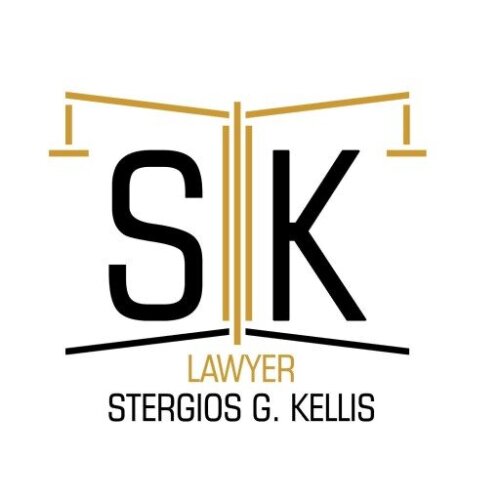Best Commercial Real Estate Lawyers in Xanthi
Share your needs with us, get contacted by law firms.
Free. Takes 2 min.
Free Guide to Hiring a Real Estate Lawyer
List of the best lawyers in Xanthi, Greece
About Commercial Real Estate Law in Xanthi, Greece
Commercial real estate in Xanthi covers a wide range of property types used for business activity - retail shops, offices, warehouses, hotels, restaurants, industrial sites and mixed-use developments. Xanthi is a regional center in northeastern Greece, part of the region of East Macedonia and Thrace. Like the rest of Greece, commercial transactions and use are governed by national law together with regional and municipal planning rules. Transactions typically involve notaries, local cadastral records, tax authorities and municipal services. Because of overlapping rules on ownership, planning, permits and taxation, commercial real estate matters commonly require coordinated legal and technical advice.
Why You May Need a Lawyer
A lawyer with experience in commercial real estate can help protect your investment, avoid surprises and move deals to closing. Common situations where people need legal help include:
- Buying or selling commercial property - preparing and reviewing sale agreements, ensuring transfer of clear title, and handling closing formalities with a notary.
- Leasing commercial premises - drafting and negotiating leases, ensuring tenant and landlord obligations are clear, and handling disputes over rent, repairs or termination.
- Due diligence - investigating title, encumbrances, planning status, building permits, liens, environmental issues and outstanding taxes.
- Development and construction - advising on zoning, building permits, planning approvals, contractor agreements and defect claims.
- Financing - drafting or reviewing mortgage, pledge and security documents and advising on enforcement procedures.
- Regulatory compliance - ensuring compliance with health, safety, fire, environmental and licensing rules relevant to the business using the property.
- Disputes - representing parties in negotiations, mediation, arbitration or court when there are contractual disputes, boundary issues, easement claims or landlord-tenant conflicts.
Local Laws Overview
Key legal and administrative areas that affect commercial real estate in Xanthi include:
- Ownership and title - Property rights are governed by national property law and recorded in the cadastre or, where not yet registered, in historic land registries. Each property should be identified by its cadastral number and be free of undisclosed encumbrances.
- Land registry and cadastre - The Hellenic Cadastre records ownership and encumbrances. KAEK numbers and up-to-date cadastral entries are essential in transactions.
- Planning and zoning - Municipal urban plans, zoning regulations and the national planning framework determine permitted uses, density, building height and setbacks. Commercial uses must conform to the local zoning regime and to any special designations.
- Building permits and occupancy - Construction, alterations and change of use typically require building permits and final occupancy authorizations issued by competent municipal or regional authorities following submission of technical studies and approvals.
- Environmental and sectoral permits - Certain activities require environmental assessments or sector-specific licenses - for example, food service, alcohol service, waste handling or industrial operations.
- Leasing and tenant protections - Commercial lease terms are primarily contractual, but certain statutory provisions and case law influence enforcement, renewal rights and termination procedures.
- Mortgages and security - Mortgages and other security interests must be properly registered to be effective against third parties. Enforcement follows civil procedures and may involve public auctions.
- Taxes and duties - Transactions attract transfer taxes or VAT depending on the nature of the sale, plus notary and registration fees. Owners pay property taxes and municipal levies, and rental income is taxable under Greek tax law.
- Foreign ownership and restricted areas - Acquisitions by non-Greek or non-EU nationals can be subject to additional checks or permissions, especially in border or security-sensitive zones. Always check whether the property is in a restricted area before proceeding.
Frequently Asked Questions
Can a foreign investor buy commercial property in Xanthi?
Yes - foreign individuals and companies can generally acquire commercial property in Greece. However, certain areas - for example, designated border or security-sensitive zones - may require special government permission for acquisition. Non-EU buyers should obtain legal advice early to confirm any restrictions and to ensure compliance with registration and tax obligations.
How do I check who owns a property and whether there are mortgages or liens?
Title and encumbrance information is checked through the Hellenic Cadastre if the property is registered, or through local land registries if not yet cadastralized. A lawyer will obtain the cadastral identifier, request official extracts, and review any recorded mortgages, liens or easements. It is essential to verify that the seller has clear title and authority to sell.
What permits are required to change the use of a building to a commercial activity?
Changing use typically requires compliance with local zoning and building regulations and may require a permit or a change-of-use approval from the municipal or regional planning authority. Additional permits may be needed for health, fire safety, environmental or sector-specific requirements depending on the activity.
Is a written lease required for commercial rentals?
Commercial leases should always be in writing to record duration, rent, deposit, maintenance obligations, subletting rights and termination conditions. Written agreements reduce disputes and are usually required to register long-term leases or to rely on certain legal protections.
What taxes and costs should I expect when buying commercial real estate?
Costs typically include transfer tax or VAT depending on the transaction type, notary fees, registration fees, legal fees and any outstanding municipal or utility charges. After purchase, owners pay property taxes and possibly municipal levies. Tax treatment depends on whether the property is a new build, the status of the seller and buyer, and other transactional facts - so get tailored tax advice.
How long does the purchase and registration process usually take?
Timing varies by property and locality. The transaction itself - from signing a private sale agreement to notary closing - can take from a few weeks to several months depending on financing, due diligence and permit availability. Registration in the cadastre may take additional weeks. Complex due diligence or bank financing can extend the timeline.
What should a due diligence checklist include for a commercial purchase?
Important due diligence items include: confirmation of seller identity and title; cadastral records and KAEK; existence of mortgages or liens; building permits and occupancy certificates; zoning and permitted uses; environmental reports; tax and social security liabilities; utility connections; easements and access rights; and planning restrictions or public works claims.
Can a landlord evict a commercial tenant easily?
Eviction depends on the lease terms and applicable law. Greek procedures require adherence to contractual notice rules and, where applicable, judicial enforcement for unpaid rent or unlawful occupation. Commercial eviction is usually quicker than residential eviction, but it still requires following formal procedures and may involve court action.
What protections exist for investors developing commercial property?
Protections include contractual tools such as construction contracts, performance guarantees, insurance, and retention mechanisms for payment. Administrative protections involve ensuring permits and approvals are properly issued and recorded. Legal counsel can structure agreements and securities to mitigate contractor risk, delay and cost overruns.
Who enforces planning and environmental rules, and what happens if there is non-compliance?
Municipal and regional authorities enforce planning and building rules, while national and regional bodies oversee environmental compliance. Non-compliance can lead to fines, orders to suspend or demolish unauthorized works, and difficulties transferring or insuring the property. Prompt legal and technical remediation is usually required to regularize the situation.
Additional Resources
Useful bodies and professionals to contact when dealing with commercial real estate in Xanthi include:
- Municipality of Xanthi - for local zoning, building permits and municipal authorizations.
- Regional Unit of Xanthi or the Region of East Macedonia and Thrace - for regional planning matters and permits.
- Hellenic Cadastre - for cadastral records and ownership extracts.
- Independent Authority for Public Revenue - for tax guidance on transfers, VAT and income taxation.
- Local Notaries - notaries handle deed formalities and registration steps during property transfers.
- Xanthi Bar Association - for referrals to qualified local lawyers with real estate experience.
- Local Chamber of Commerce - for business-related guidance and contacts in Xanthi.
- Licensed surveyors, civil engineers and environmental consultants - for technical surveys, building permit documentation and environmental assessments.
- Certified accountants and tax advisors - for transaction structuring and post-acquisition tax compliance.
Next Steps
If you need legal assistance with commercial real estate in Xanthi, consider the following practical steps:
- Prepare basic information - the property's address, cadastral number if available, title documents you have, and the intended use or transaction type.
- Book an initial consultation with a Greek lawyer experienced in commercial real estate. Confirm the lawyer is licensed and ask about experience with transactions in Xanthi and with the type of property involved.
- Request a scope of work and fee estimate - ask whether the lawyer charges a fixed fee for defined tasks or an hourly rate, and whether they will coordinate technical advisors.
- Authorize due diligence - instruct your lawyer to obtain official title extracts, cadastral searches, building permit records and tax certificates. Insist on written confirmation of any risks found.
- If you are abroad, arrange for translated and apostilled documents and consider granting a limited power of attorney to a trusted lawyer or agent to act on your behalf for closings.
- Negotiate and document the transaction - use your lawyer to draft or review sale agreements, leases, mortgages or development contracts and to ensure closing documents, notary acts and registrations are completed correctly.
- Plan for post-acquisition compliance - update registrations, notify tax authorities, obtain or regularize permits, and ensure ongoing compliance with municipal and environmental obligations.
Working early with a qualified lawyer reduces risk, clarifies costs and helps ensure your commercial real estate objectives in Xanthi are achieved smoothly and lawfully.
Lawzana helps you find the best lawyers and law firms in Xanthi through a curated and pre-screened list of qualified legal professionals. Our platform offers rankings and detailed profiles of attorneys and law firms, allowing you to compare based on practice areas, including Commercial Real Estate, experience, and client feedback.
Each profile includes a description of the firm's areas of practice, client reviews, team members and partners, year of establishment, spoken languages, office locations, contact information, social media presence, and any published articles or resources. Most firms on our platform speak English and are experienced in both local and international legal matters.
Get a quote from top-rated law firms in Xanthi, Greece — quickly, securely, and without unnecessary hassle.
Disclaimer:
The information provided on this page is for general informational purposes only and does not constitute legal advice. While we strive to ensure the accuracy and relevance of the content, legal information may change over time, and interpretations of the law can vary. You should always consult with a qualified legal professional for advice specific to your situation.
We disclaim all liability for actions taken or not taken based on the content of this page. If you believe any information is incorrect or outdated, please contact us, and we will review and update it where appropriate.











